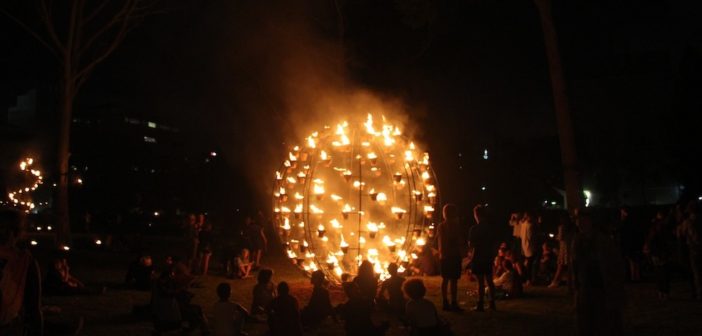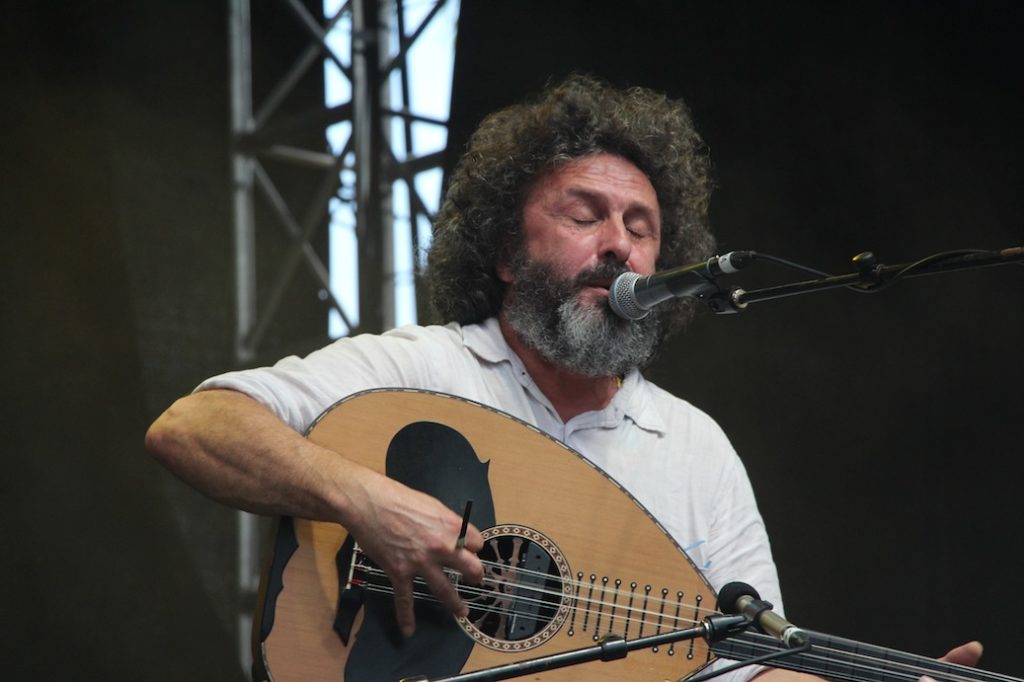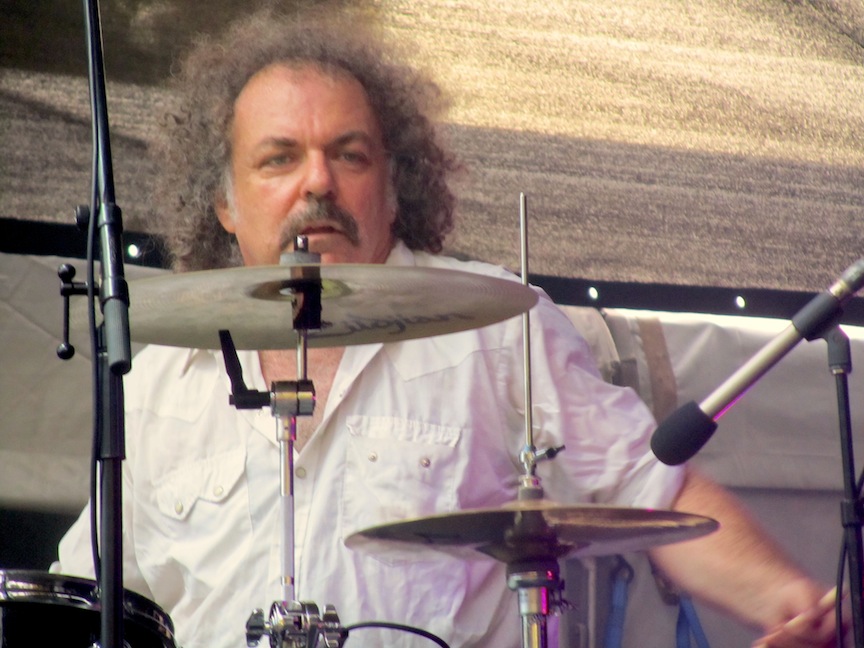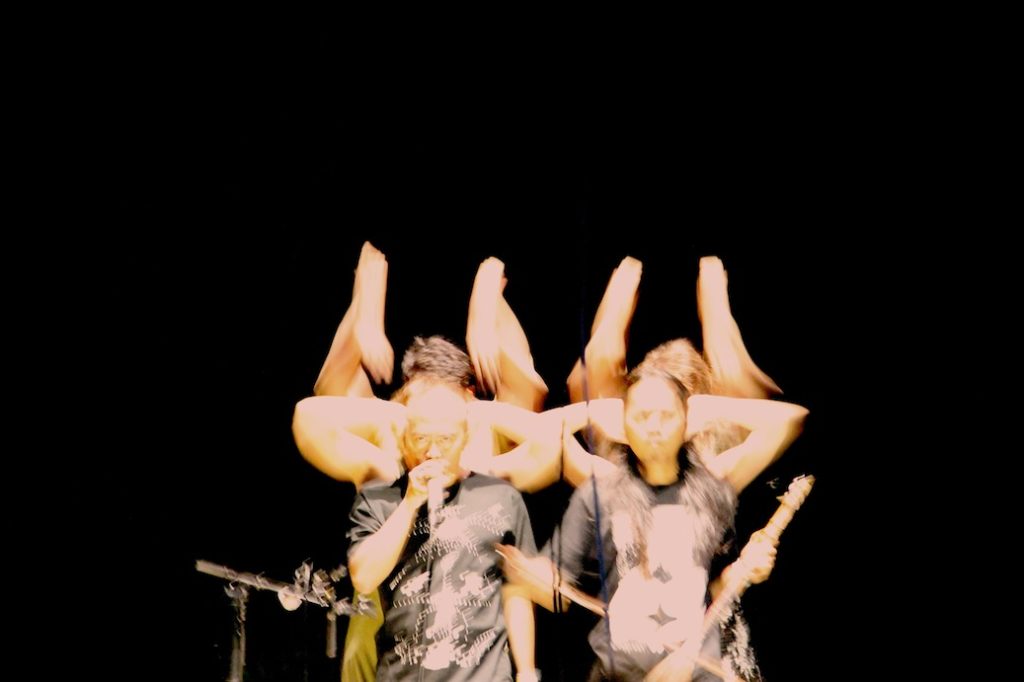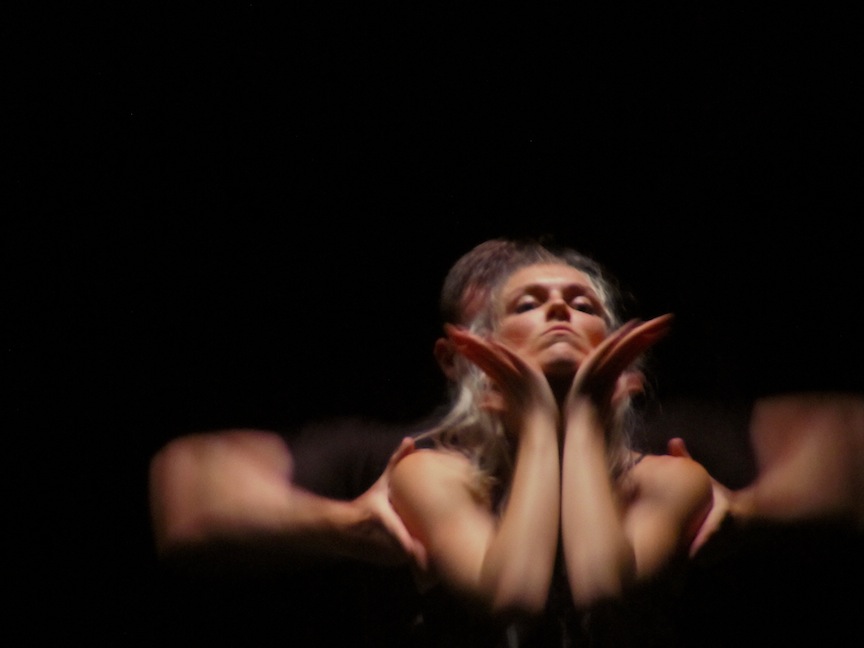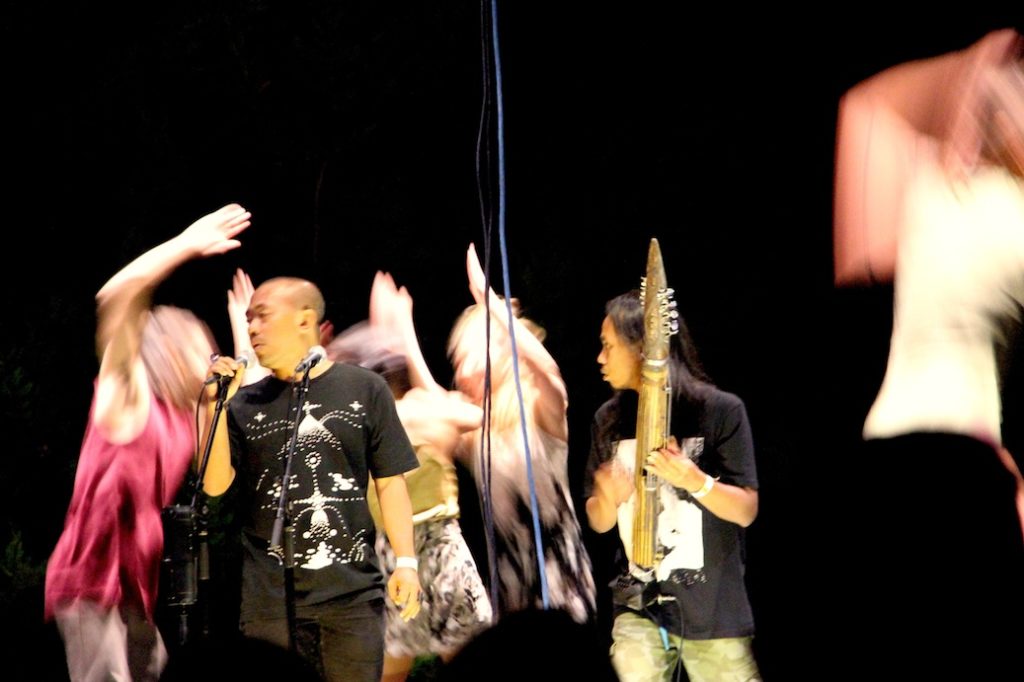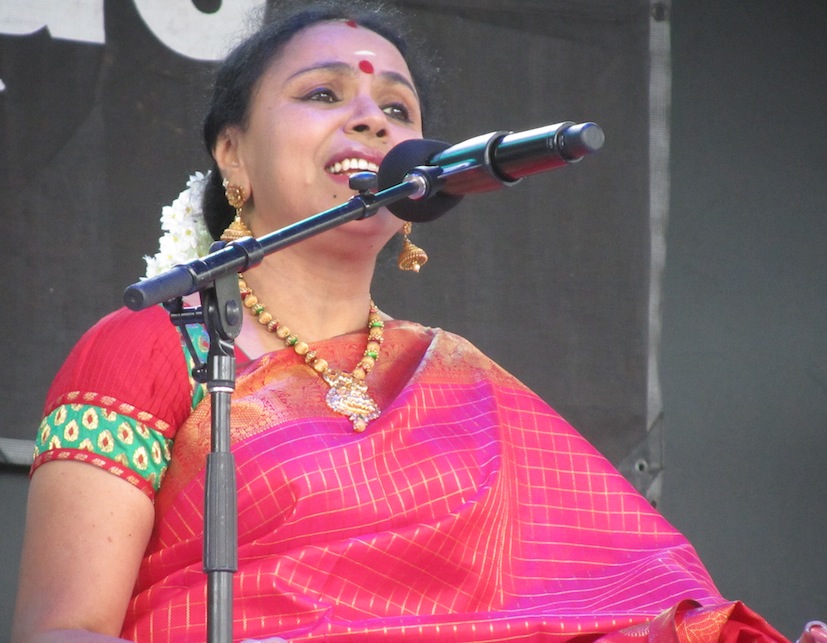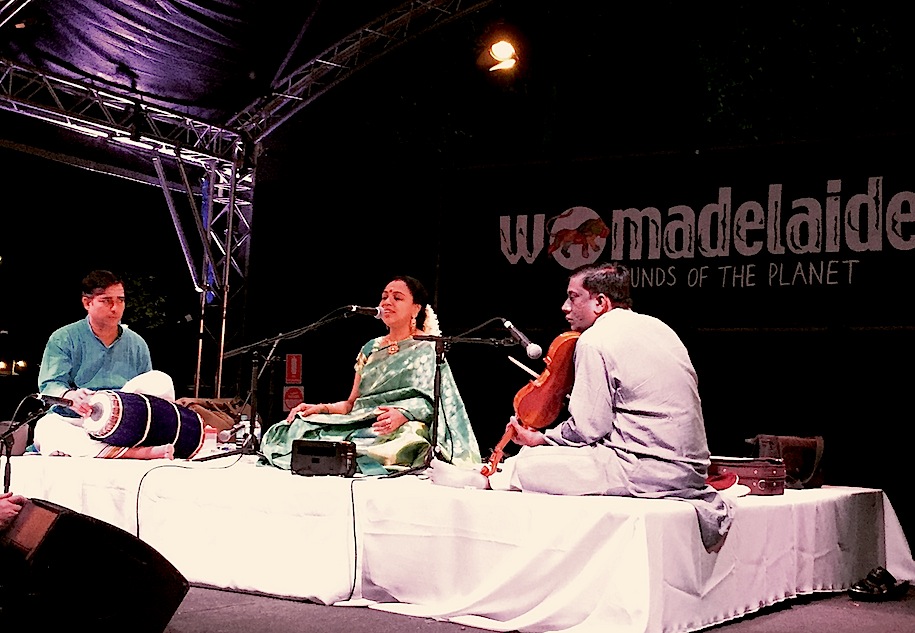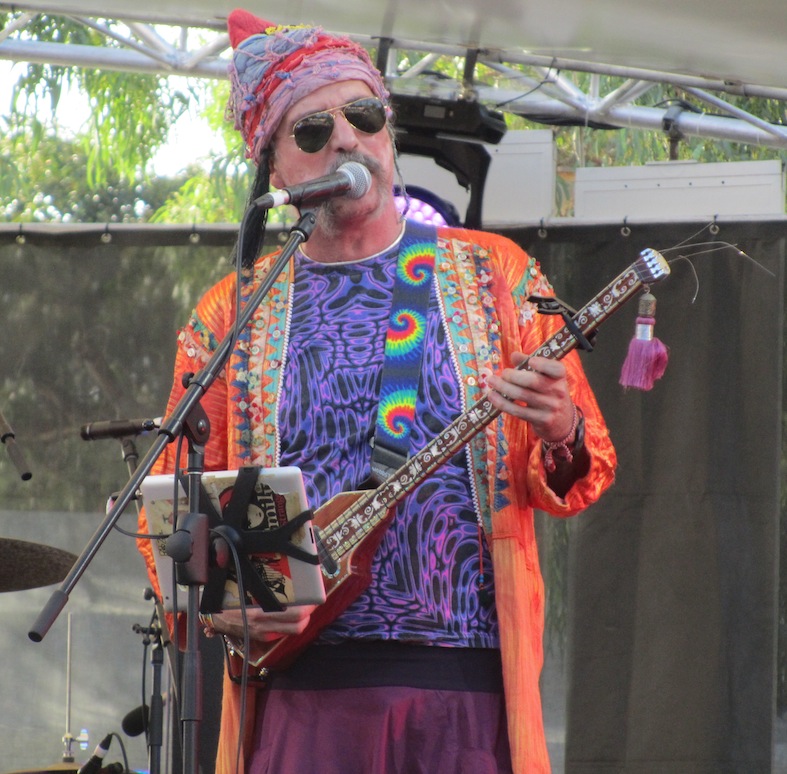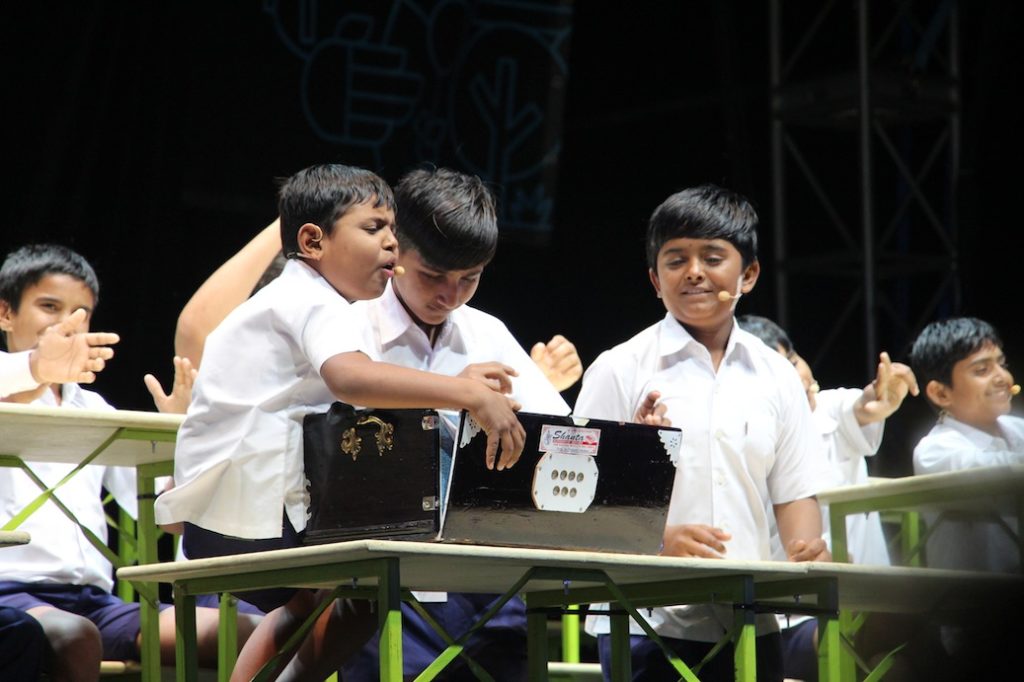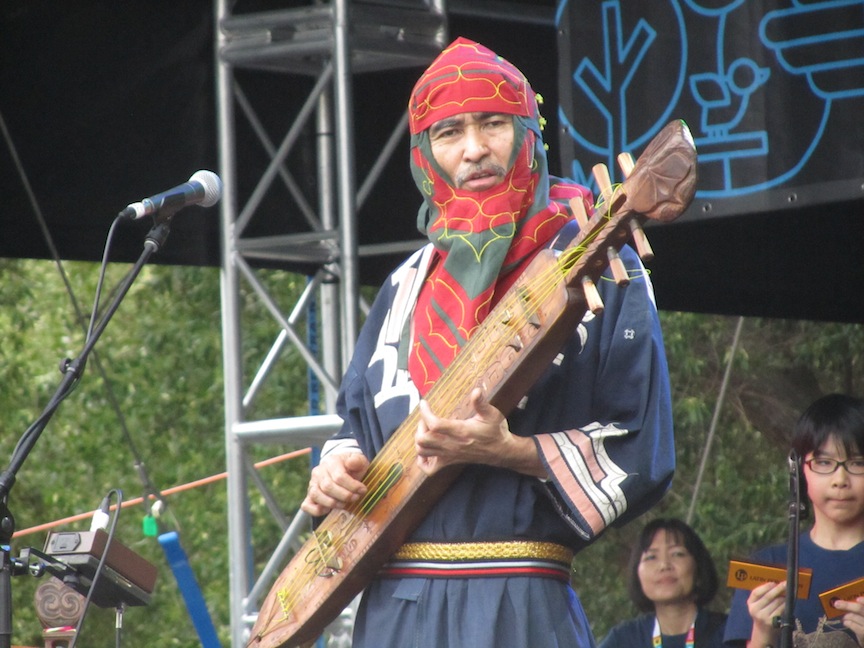Something happens to you when you step into the Adelaide Botanical Gardens for Womadelaide, an annual festival that celebrates cultural exchanges, unique sounds and hitherto unknown traditions. It’s impossible not to feel a palpable sense of relief. With an audience as diverse as the performers, it’s a place of tolerance, curiosity and acceptance – the antithesis of a lot of the xenophobia and sensationalism currently playing out in our nations media. At Womadelaide barriers come down, connections are formed and our cultural understanding can only grow.
The connection between percussionist Jim White (The Dirty Three) and Cretan Lute player George Xylouris (Xylouris Ensemble) is curious. Whilst they’re coming from entirely different worlds, they’re definitely meeting somewhere in the middle. That middle is improvisation, and whilst they clearly had some pre arranged organised moments, there was a real push and pull between the duo and definitely some flying without a net – which became even clearer when you moved closer and watched their faces and the way the interacted. It’s a risk reward scenario with White’s flexible, at times even militaristic percussion melding remarkably with Xylouris’ upbeat lute and vocals. This is music that transcends boundaries, equally at home in rock, jazz and world music festivals.
New Orleans The Hot 8 Brass Band, were one of this year’s headliners, who’s ultra funky hip hop and soul infused brass, and in particular their incredible cover of Marvin Gaye’s ‘Sexual Healing’ had built considerable expectation. Their performance whilst edgy and energetic lacked the precision and crispness of their recorded material – which probably should have been expected. Yet surprisingly a couple of days later I found myself out of their line of sight, with their immense sounds booming from a nearby stage and it was incredible; precise, blistering and funky as hell. It’s hard to know whether one performance was markedly better or whether their stage presence proved too distracting. One thing was clear however, there’s nothing more life affirming than a wall of funky assed brass hitting you at high volume. They apparently play funerals too.
Indonesian experimental duo Senyawa’s presence at Womadelaide was entirely unexpected, primarily due the frequent extremity of their sound. Yet they’re also one of the most unique ensembles around thanks to their ability to effortlessly straddle the seemingly conflictual worlds of traditional cultural music alongside genres like metal and experimental improvised music. The last time I saw them was the Melbourne Jazz Festival – they can simultaneously exist everywhere yet belong nowhere which I’d assume is both a blessing and a curse.
It’s this kind of bold programming that makes Womadelaide so great, reminiscent of their decision to invite Tanya Tagaq in 2011 (which I’m still reeling from) and Margaret Leng Tan a couple of years ago. Senyawa’s collaboration with Lucy Guerin (Chunky Move) and Dancenorth was performed on a small fit for purpose stage. Between Senyawa’s throaty growls, deep wailing, remarkable pitches and ominous/ terrifying plucking and riffing, the dancers writhed, clashed, intersected and almost re amalgamated in some kind of Cronenbergian ecstatic new flesh scenario. I’ve never seen anything like it. To some extent the movement seemed to contextualise Senyawa’s propensity for the weird, with their sounds a sonic virus infecting the dancers and creating a rabid ritualistic frenzy. I went back to watch it again the next night infected myself by the rapture – and even surreally watched Senyawa cook a sambal in the Taste of the World tent at one point.
It was only the second time out of the country for the Hanoi Masters, an ensemble of elderly traditional musicians whose music is an attempt to deal with the trauma of the Vietnam War. “We call it the American war,” offered the younger multi instrumentalist/ student. As death rites some of these songs would traditionally go for up to 10 hours – as long as it takes. Their instruments were strange and fascinating, and it was beautiful not only to watch these performers being treated with the respect they deserve, but also to experience a culture borne out of a trauma in which Australia played an active role. They ended with ‘Purple Haze’ on a traditional one-string instrument. “You might know this one,” they suggested.
Speaking of the traditional, South Indian Carnatic singer Sudha Ragunathan (see our interview with her here) and her ensemble of percussion and violin were incredible across two performances. With her formal approach, carefully explaining the traditions of her pieces, her highly emotional classical ragas were almost overwhelming and had a profound effect on the audience. Her first show at the Zoo Stage had her directly facing the inclement weather, and it was impossible not to be astounded by her remarkable vocal control and ability to shift between octaves with both speed and agility. Representing centuries of musical tradition, her amazing musicians both watched her eagerly, tuned in to her slightest gesture. Whilst she would control their pitch and tempo with the flick of her hand, you couldn’t help but feel that the musicians were actually anticipating her wishes, studying her, hyper observant, and the interplay was electric, as she would bestow one or the other with her favour. The second performance (though marred by the questionable decision to empty the nearby portable toilets midway – the first example in many years of the Womadelaide machine breaking down) was actually her finest, as not only did Ragunathan stoically ignore the stench (and in fact it felt like the music overcame it), but having the opportunity to spend more time with this remarkable trio provided another furtive glimpse into the depth of their musical genius.
But genius comes in many guises, and Turkish psych legends Baba Zula took Womadelaide by the scruff of the neck and wouldn’t let go. They played on Saturday night on the Zoo stage after dark and they well and truly brought the party with their anti establishment conscious music. Drawing on the psychedelic rock and folk traditions of the likes of Erkin Koray and Moğollar, this ensemble who have existed since 1996 feature electric oud, darbuka percussion, electronics, vocals and electric saz come across like some kind of super heroes, except their talents are making great music and imploring you to smash the state. “Don’t listen to the presidents and politicians,” they offered, “Listen to what the poets say,” and later they scream “Do not obey!” They’re hilarious and ridiculous, yet their appearance and manner belie a serious message – however by delivering it with humour and inclusiveness it has a real power to break through. Playing at Womadelaide meant a lot to them, as I spoke to Murat, the electric saz guy during the performance of Japanese post dub traditional experimentalists Oki Dub Ainu Band (who they have collaborated with previously) and he mentioned that Turkish folk icon Selda Bağcan was booked to play the very first Womad in the UK, yet the government prevented her from attending by confiscating her passport. Their appearance at Womadelaide was a gift to her, and also the late Can percussionist Jaki Liebezeit (to whom they dedicated a song). Apparently they also experience some difficulties of their own back home in Istanbul.
The award for the cutest and most precocious performance has to go to The Manganiyar Classroom, which featured 35 boys aged 8 to 16 demonstrating the musical traditions of Rajasthan, in what is ostensibly a reworking of Footloose set in an Indian classroom. All wearing Madonna style microphones the kids were incredible, not only with their collective vocals, but also their acting skills. It was personality overload. There was a rumour going around that Disney India scouts were in the audience with checkbooks at the ready. This kind of theatrical performance, coupled with incredible music was impossible not to be enchanted by and their two performances were essential.
From the languid searching of Australian experimental improvising ensemble Tangents to the ecstatic devotion of the Moroccan influenced Jewish vocal choir Piyuet Ensemble, from Emir Kusturica’s Benny Hill moves with his gypsy ensemble to the incredible fusion of Spain, Senegal and Western Sahara in the sound of Aziza Brahim, Womadelaide is all about worlds colliding. It’s a bounty of cultural expressions all bookended together in a way that is sometimes jarring, sometimes soothing, sometimes confusing, but always interesting. There are not too many festivals with this kind of cultural diversity, or the ability to program your own festival experience based purely on which of the seven stages your feet take you to. There’s a real consistency here not just in Womadelaide’s ideals and execution, but also its structure, abundance of choice, ability to cater to numerous tastes, and perhaps most importantly its determination to treat us all like adults. This is why I view it as a cure for much of what ails society at the moment. Womadelaide is medicine, and I’m already looking forward to next year’s treatment.
By Bob Baker Fish & Adam Skinner. Photos by Carla Martins.

